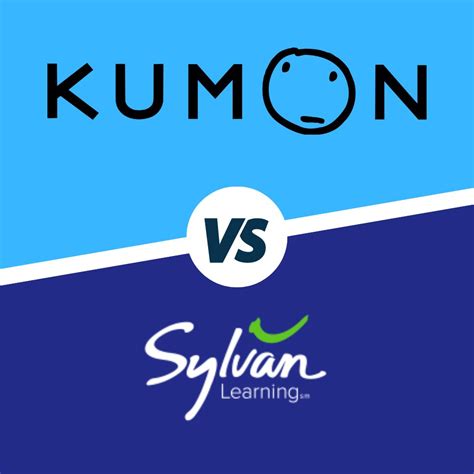Introduction
In the ever-evolving landscape of education, supplemental tutoring has become an indispensable resource for students seeking to excel academically. Among the plethora of tutoring providers, Sylvan and Kumon stand out as industry leaders, each offering unique strengths and approaches. This comprehensive comparison will delve into the key differences between these two educational powerhouses, empowering parents and students to make informed decisions about their tutoring needs.

Company Overview and History
Sylvan Learning
- Founded in 1979
- Privately held company headquartered in Baltimore, Maryland
- Operates over 750 tutoring centers worldwide
Kumon
- Founded in 1954
- Privately held company headquartered in Osaka, Japan
- Operates over 4,500 franchisee-owned centers in 55 countries
Target Audience and Focus
Sylvan Learning
- Focuses on students from kindergarten to 12th grade
- Offers tutoring in core subjects (math, reading, writing) and specialized areas (ACT/SAT prep, coding)
Kumon
- Primarily serves elementary and middle school students
- Emphasis on foundational math and reading skills through self-paced, worksheet-based instruction
Teaching Methodology
Sylvan Learning
- Employs a personalized approach tailored to each student’s individual needs and learning style
- Utilizes experienced tutors who provide one-on-one or small group instruction
- Focuses on building critical thinking, problem-solving, and study skills
Kumon
- Adheres to a standardized curriculum that is completed at the student’s own pace
- Students progress through worksheets independently with minimal tutor supervision
- Reinforces concepts through repetitive practice and daily assignments
Technology Integration
Sylvan Learning
- Leverages technology to enhance tutoring sessions through interactive software and online resources
- Offers online tutoring options for flexibility and convenience
- Utilizes data analytics to track student progress and adjust instruction accordingly
Kumon
- Emphasizes hands-on learning and paper-based materials
- Limited use of technology in the classroom, with a focus on developing students’ self-direction
Curriculum and Assessments
Sylvan Learning
- Develops and aligns curriculum with state and national standards
- Employs a diagnostic assessment to determine student strengths and weaknesses
- Provides ongoing progress reports to monitor student development
Kumon
- Follows a global curriculum designed by the Kumon Institute of Education
- Utilizes placement tests to assign students to an appropriate starting point
- Progress is tracked through completion of worksheets and regular assessments
Pricing and Payment Structure
Sylvan Learning
- Payment varies depending on the individual student’s needs and the number of tutoring sessions
- Hourly rates typically range from $50 to $100 per session
Kumon
- Flat monthly fee based on the student’s program level
- Fees typically range from $150 to $250 per month
Testimonials and Success Rates
Sylvan Learning
- High customer satisfaction ratings with an average of 4.5 out of 5 stars on review sites
- Claims to have helped over 3 million students improve their academic performance
Kumon
- Boasts over 6 million students worldwide with success stories across various countries
- Reports that 90% of Kumon students surpass their grade level in math and reading
Which Tutoring Option is Right for You?
The choice between Sylvan and Kumon depends on the specific needs and preferences of the student and their family.
- Sylvan Learning: Ideal for students seeking personalized attention, a tailored learning plan, and a wider range of subject options.
- Kumon: Suitable for students who prefer a structured, self-paced approach with an emphasis on foundational skills in math and reading.
Hybrid Approach:
Some students may benefit from a hybrid approach, combining tutoring from both providers. For example, they could utilize Kumon for foundational skill development and supplement it with Sylvan tutoring for targeted support in specific subjects.
Conclusion
Sylvan and Kumon offer distinct tutoring experiences that cater to different educational needs. Sylvan’s personalized approach, technology integration, and comprehensive curriculum make it a valuable option for students seeking individualized support. Kumon’s structured program, self-directed learning, and focus on foundational skills make it a suitable choice for students looking to develop a strong academic foundation. By understanding the key differences between these two industry leaders, parents and students can make informed decisions that will empower them to achieve their academic goals.
